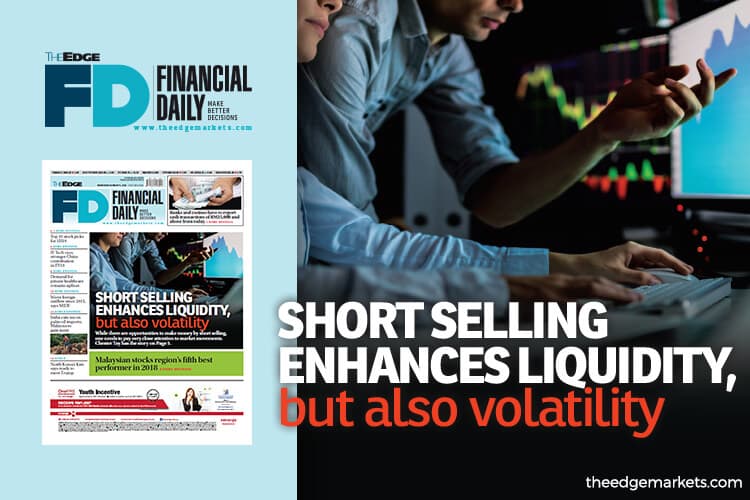
This article first appeared in The Edge Financial Daily on January 2, 2019
KUALA LUMPUR: Intra-day short selling (IDSS) was reintroduced in April last year with the aim of enhancing liquidity in the equities market, but the mechanism has a major side effect — it amplifies market volatility when sentiment is negative.
This drawback was underscored a month later in May last year after the Barisan Nasional (BN)-led government was dumped in the 14th general election (GE14). With the new untested Pakatan Harapan coalition at the reins after 60 years of uninterrupted BN rule, the markets were bound to be roiled.
And they were. When the markets opened on May 14, the stock exchange was awash in a sea of red, with companies perceived to be aligned to the BN administration particularly battered.
Government services provider MyEG Services Bhd (MyEG), construction company George Kent (Malaysia) Bhd, Destini Bhd, Malton Bhd, Petra Energy Bhd and Gamuda Bhd bore the brunt of the selldown as investors bailed out in panic. Such was the selling pressure, with MyEG and George Kent hitting limit down on at least two trading sessions.
Under the IDSS rule, proprietary day trading (PDT) and IDSS are suspended when a counter fluctuates more than 15 sen or 15% from its last closing price.
In all, the Bursa Malaysia issued a total of 36 suspensions in May last year, underscoring the uncertainty and capriciousness of the market post-GE14.
But by June 2018, some measure of calm had returned, and the number of suspensions eased to five for June and July, respectively.
MIDF Amanah Investment Bank Bhd head of research Mohd Redza Abdul Rahman told The Edge Financial Daily that even though overzealous short sellers might push the market lower, Bursa Malaysia’s PDT and IDSS suspensions help prevent the overreaction from worsening the share price of affected counters.
In recent months, owing to external issues including the US-China trade tensions and the US Federal Reserve interest rate hikes, as well as the weak domestic economy and feeble corporate earnings, the last quarter of 2018 also saw about 10 PDT and IDSS suspensions per month.
“There were more short selling suspensions towards year end due to the abruptness of share price declines. If a share falls gradually, it won’t hit the dynamic limit.
“But lately, the price drop has been rather abrupt, owing to the confluence of quarterly results that were below expectations, as well as negative market sentiment driven by external and domestic events,” Mohd Redza said.
Rakuten Trade Sdn Bhd vice-president of research Vincent Lau is not entirely surprised.
“With the recent volatility and market weakness it is not surprising to see many stocks being triggered with the suspension of PDT and IDSS when their prices drop more than 15 sen or 15%.
“Without the IDSS suspension mechanism, short selling will exacerbate the fall in a volatile market,” he added.
Still, there are market players who believe that Malaysia is not ready for IDSS as its markets are not sufficiently liquid.
Areca Capital Sdn Bhd chief executive officer (CEO) Danny Wong opines that as the Malaysian capital market is less liquid, it is not healthy for Bursa to implement IDSS.
“It is normal during a bear market for short selling to increase as it is one of many investment strategies. But personally I do not agree with short selling in Malaysia because our market is not as liquid as other developed markets,” he said over the phone.
“It is not healthy in the sense that investors are selling what they don’t have, and it could escalate the market downturn and volatility, which would [then] affect investors who do not short sell.
“Normal investors have less [of an] appetite to sell below their investment’s intrinsic value, but for short sellers, they are motivated to pressure the share price for the sake of their profit.”
Phillip Capital Management Sdn Bhd chief investment officer Ang Kok Heng is of the view that IDSS would have lesser impact if Malaysia had a deep enough market.
“Let’s say a person shorts 10 million shares of a counter, it can be done in half an hour, and immediately the share price drops 5%. But when you buy back the 10 million shares, you may need two hours, and the counter may not recover the 5% it lost.”
Prime Minister Tun Dr Mahathir Mohamad is also not a fan of short selling. In his first tenure as prime minister, he banned the shorting of shares during the 1998 Asian financial crisis to help curb the outflow of capital.
In 2006, under then prime minister Tun Abdullah Ahmad Badawi, the ban was partially lifted, but regulated short selling was only permitted for licensed proprietary traders on Bursa.
In reintroducing IDSS in April 2018, Bursa CEO Datuk Seri Tajuddin Atan said the initiative was part of the exchange’s strategy to boost market liquidity and to further improve flexibility for market participants to refine their trading and risk management strategies.
As at press time, Bursa Malaysiadid not respond to The Edge Financial Daily’s queries for this article.
MIDF’s Mohd Redza is advising investors who intend to take advantage of the current bear market to make quick profit through IDSS, to pay close attention to market movements.
“Yes, there are opportunities to make money by short selling, but one needs to pay very close attention to market movements. There are risks as well. Should the market turn the opposite way, investors would need to close their position by buying at a higher price, hence incurring losses,” he warned.